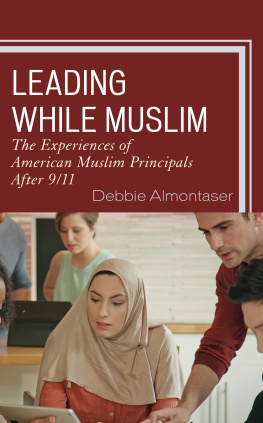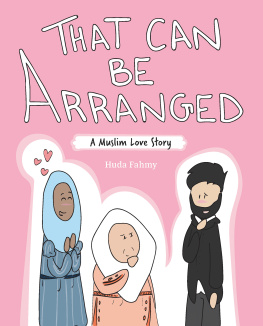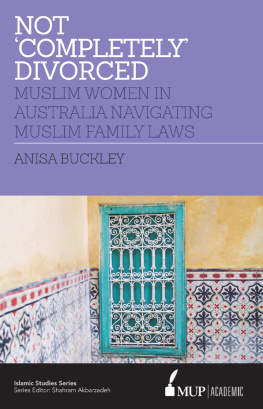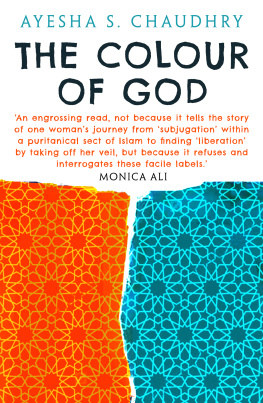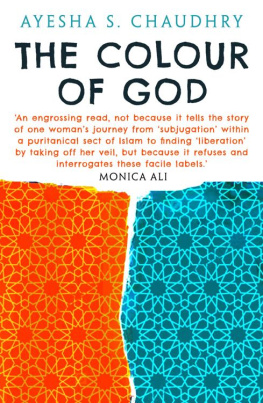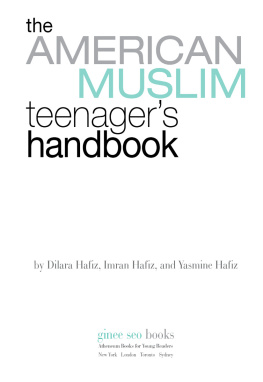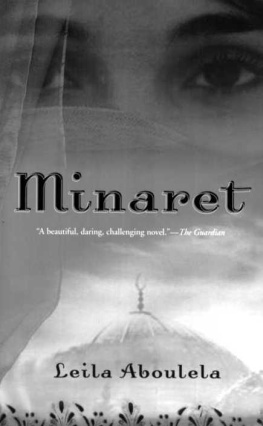
For all the men who asked, Where are our stories?
Introduction
Men dont talk about their feelingsisnt that the conventional wisdom?
Its what we bought into, anyway, which is why, for a long time, we never seriously considered doing this book.
When Love, InshAllah: The Secret Love Lives of American Muslim Women was published two years agoa collection in which twenty-five women raised their voices to tell their funny, romantic, and moving tales about the search for loveit resonated with countless readers around the world. Including men. They started to ask us, Where are our stories?
We dismissed the inquiries with a laugh. Please! Guys dont talk about this stuff.
But as the requests kept comingover e-mail, at book readings, even at dinner partiesit struck us: what if its not that men dont want to talk about their feelings, but rather that they dont have the space to do so?
Men without space? It sounds absurd. After all, men dominate corner offices and the upper echelons of leadership and power, men get the best prayer space in the mosque, and men even take up the most space on the bus (dudes, put your legs together, we get it).
But what about the emotional space to be honest and vulnerable about matters of the heart, without jeopardizing notions of masculinity and manhood? The space to talk about sex, coupled with love and intimacy, without it being a joke or the raunchy punch line from a movie?
We decided to ask. After all, there are two (or more!) sides to every story.
We asked American Muslim menour cultural and religious communityto tell us: What does it mean to be a man? To love well? To be faithful and constant? What do you do if you fail at love? How do you move forward after youve broken someones heart, or had yours broken?
And they told us.
Stories poured in from men of diverse ethnic, racial, and religious perspectivesincluding orthodox, cultural, and secular Muslims. They came from single, divorced, married, and widowed men, young and old, in large cities and small towns across the country.
They told stories of love and heartbreak, loyalty and betrayal, intimacy and insecurity. And, above all else: feelings
In this book, we share twenty-two of them.
The title of this collection, Salaam, Love, couples two essential traits of the Muslim men we know: peace and love. Colloquially, salaam also means hello. The men in this book greet us and welcome uswith open armsinto the most intimate aspects of their lives.
The subtitle, American Muslim Men on Love, Sex, and Intimacy, is a testament to these groundbreaking stories. By raising their voices, these Muslim men are leading the way for other men to recognize that being open and honest about their feelings is not only okayits intimately connected to their lives and critical to their well-being.
It goes without sayingbut well say it here anywaythat this book is not a theological treatise. Its a reflection of the real lives and experiences of Muslim menfathers, brothers, sons, and partners.
We arranged these stories to mirror the ways in which our experiences about love, sex, and intimacy are shaped and evolve:
We begin with Umma: It Takes a Village, in which our writers reflectwith humor and heartbreakon the crucial role that family, friends, and community play in our sense of self and search for love.
The men in the second section, Sirat: The Journey, share their stories about romantic, personal, and spiritual transformation. Their insights honestlyand bluntlyreveal how attitudes toward love, sex, and commitment can change over the course of our lives.
We end with Sabr: In Sickness and in Health, in which our writers lift the facade of happily ever after to share what it really takes to keep a relationship going over a lifetime.
Theres nothing like a good love story to connect us to one another and also help satisfy our curiosity about the lives of othersin this case, men. We welcome you to sit backturn off your smartphonesand listen as these writers invite you to peek into their hearts, minds, and loves.
Umma: It Takes a Village
Soda Bottles and Zebra Skins
By Sam Pierstorff
Go ahead. Ask me if I am Muslim. Its true, I am. Im white, Orange County, MTV-reality-show white. Beastie Boys circa 1986 white. The skater boy Avril Lavigne sang about white. Now, if you ask me how I came to be Muslim, I will need more timeenough time to tell you the long story about a Syrian girl from Aleppo who met a Kentucky redneck in the heart of Tennessee. Dont ask me how they got there.
Sure, he was a Korean War veteran, an English literature scholar, and a bit of an alcoholic, and she was Muslim, not entirely fluent in English, and wide-eyed with Americas freedombut the heart wants what the heart wants, right?
He was sympathetic to Islam, embracing the simplicity of one true God, instead of wrestling with the complexity of a trinity. And she was sympathetic to his vicesnothing a faithful wife couldnt cure, she thought. Of course, there were challengesaffairs, abuse, alcoholismall of which were back-burnered when their two sons came along.
The firstborn was named by my mothera Muslim nameAhmed. He would become a treasure, a spiritual son, blessed the moment al-Fatiha was whispered into his ear at birth. The second born, out of fairness and compromise, was named by my fatheran Anglo name, Samuel Johnson, after the eighteenth-century English critic and writer, whom he had studied. Thats me. I would follow a more crooked path, spend more time outdoors than in, blessed at birth by my fathers whiskey breath instead of his prayers.

By fifth grade, the back burner could no longer contain the flames of my parents marital problems. They split up. Our home went up in smoke. Poof. Gone. My father moved an hour westward toward the ocean, while my mother raised two boys alone in the desert of Riverside County, California, with all of the might left in her four-foot olive frame. She jarred my brother and me awake for dawn prayers and chauffeured us to the mosque on Fridays in her seatbeltless 1962 Studebaker while she tied her hijab in the rearview mirror and asked my brother to steer. Above all else, she taught us the five essential pillars of Islam: 1) believe in Allah and his final prophet, Muhammad; 2) pray five times a day; 3) dont look at girls; 4) dont speak to girls; 5) dont think about girls.
Girls, more than alcohol and pork, were haram. Hell was the tip of my mothers wooden spoon as she chased me after girls called the house, wanting to know why girls had my number. She yelled about religion and temptation and how kissing spread disease and French kissing made babies. Gods anti-girlfriend stance was unfair and complicated. But my first crush was simple and powerful: Amy McKiernan. Every day I watched her on the playground, the sun in her blonde curls, her perfect pink-lipped smile. My heart was bursting every time Amy McKiernan pranced across the blacktop. My heart was not bursting with love for a deity that I could not see or touch or smell. Amy smelled like citrus, like rose petals, like love. One day after school, Amy and I circled behind the schools baseball dugout and nuzzled against each other. Her lips met mine. It was quick. Innocent. For a moment, I thought it would conjure the devil, but nothing happened. Just a spark that set fire to my heart. It felt like a tiny piece of heaven.



